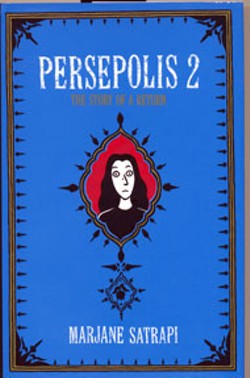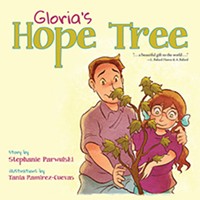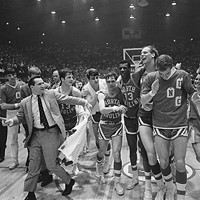Back to Iran
Persepolis sequel leads CL's recommended reads
The Sunday Philosophy Club by Alexander McCall Smith (Pantheon). If you love mysteries but are sick of the gore and the high tech machinations of Clancy, Cornwell, Reichs and others, here's your series. This is the first book in Smith's new series -- he's author of the acclaimed No. 1 Ladies' Detective Agency books -- and it's a promising start. Isabel Dalhousie lives in Edinburgh, Scotland. Smith sets up a tidy life for this younger, more up-to-date Miss Marple: Isabel is educated, single and only has to work part time as the editor of a philosophy journal since she's a woman of independent means. Isabel, therefore, has time to ponder the moral and philosophical dilemmas that most of us simply ignore. She's also curious and observant -- politely nosy, really. While at a symphony concert, she witnesses a young man's fall from the nosebleed section. She ponders herself right into the middle of the situation, even as the authorities decide that it was probably an accident. With help from Grace, her prickly housekeeper, and Jamie, a handsome friend of her niece, Isabel tries to figure out the reasons behind the young man's death. Be warned, if you like fast-paced action, this isn't the book for you. But if you like lighter fare with some substance, Isabel is a charming companion. --Ann Wicker
The Small Boat of Great Sorrows by Dan Fesperman (Vintage Crime). Set in the post-Tito madness of the Balkan War and throughout post-WWII Europe, Dan Fesperman's Small Boat... includes a skillfully intricate murder plot amid the soul-searching. The Charlotte-born foreign correspondent for the Baltimore Sun continues the tale of Vlado Petric, the former Sarajevo homicide detective and the hero of Fesperman's award-winning debut, Lie in the Dark. Here, the author creates a moody modern noir piece reminiscent of Alan Furst's WWII thrillers, but also examines Old Europe's never-healing ethnic wounds. --John Schacht
The Midnight Band of Mercy by Michael Blaine (Consortium). Blaine nails how the newspaper business operated 100 or so years ago in this mystery based on true events in New York City in 1893. Part of what he does very well is recreate that era. From the street urchins to the law partners who seem to run the city, Blaine's Max Greengrass operates in a stew of humanity. Max is a "space-rater," that is, a newspaper reporter who sells stories by the inch to whichever paper he is currently loyal to -- in Max's case, the New York Herald. Max almost literally stumbles over some dead cats and thus a story involving a complex mix of scams played out in a city teeming with life and wallowing in death. --Ann Wicker
Che's Chevrolet, Fidel's Oldsmobile: On the Road in Cuba by Richard Schweid (UNC Press). This unexpectedly entertaining and enlightening book is about Cubans and American cars; specifically, "vintage" American roadsters from the 1950s. Since Castro's rise to power in "59, new American cars have been unavailable, but Cubans have kept untold thousands of 1959-and-older American autos on the road by improvising repairs. Havana and Santiago de Cuba alone have over 60,000 old Chevies, Plymouths, Packards, DeSotos, Fords, Chryslers, you name it, taking people to work and back, running errands, transporting farm goods, and anything else you can do with a working car. Schweid has a knack for the telling anecdote and while roving over the island, creates a picture of a widely diverse culture by retelling the stories of mechanics, musicians, artists, carpenters and others, all of them big fans of old American cars. Gradually, the country's omnipresent old, nearly worn out cars, valiantly chugging along, emerge as a metaphor for the country's economy and history during the past 40 years. The book is illustrated with 60 photographs. --John Grooms
Bloodlines of Shackleford Banks by BJ Mountford (John F. Blair). If you loved Nancy Drew and Misty of Chincoteague, then here's a great grown up mystery. Mountford created an appealing lead character in Roberta "Bert" Lenehan, in her first mystery, Sea-born Women. This time, Bert, an independent 50ish woman, volunteers for the National Park Service during the annual roundup and health testing of the wild horses on Shackleford Banks, a NC barrier island. First, there's a missing foal and then a volunteer turns up dead. Mountford weaves in chapters of speculative history about how the horses ended up on the Outer Banks, which adds depth to the story even if her anthropomorphizing of the horses is a bit much. She also does a fine job of showing the differing sides in the continuous battle of tourists, naturalists, preservationists, animal lovers, and residents over an area they all feel they know best. --Ann Wicker
Dead Water by Barbara Hambly (Bantam). This series, set in pre-Civil War New Orleans, is wonderfully written. Hambly, to borrow Emeril's phrase, "kicks it up a notch" in this very deftly woven tale of intrigue: hero Benjamin January -- surgeon, musician, free man of color -- is asked by his banker to hunt down a bank employee who has absconded with a large portion of the bank's money. This money, of course, includes January's own funds, which were to finance not only the purchase of a house for him and wife Rose, but a school for freed slaves. January teams up with his friend and fellow musician Hannibal Sefton, who poses as January's master, so they can follow the embezzler on a steamboat journey up the Mississippi. In an interesting twist, Hambly works in a young Col. Jefferson Davis as one of the more sensible and likeable passengers on the ill-fated boat. --Ann Wicker
The Wimp Factor by Stephen J. Ducat (Beacon). The Wimp Factor looks at the way politics is often influenced by male insecurities and fears. Coming in the middle of a war-drenched election season, this is a book for our times even though Ducat points out that this is nothing new in American politics. Think of W's dad's wimpy image and its role in his 1992 loss. Think of the right's irrational hatred of Hillary "The Castrating Ball Buster" Clinton. Think of W's "lone ranger" image-making and how it has played to a nation still shaky from 9/11. Ducat is at times a bit too academic, but overall his take on the role that male fear of a changing world plays in politics is compelling and very insightful. --John Grooms
Latest in Books
Calendar
-

NEW WINDOW GALLERY-Pat Rhea-ACRYLIC PAINTINGS-April 05-30 2024 VALDESE, NC 28690 @ New Window Gallery/Play It Again Records
- Through April 30, 12 p.m.
-
Derek Hough - Symphony Of Dance @ Ovens Auditorium
-

"Blood Residue Analysis of Paleoamerican Stone Tools in the Carolinas" @ Native American Studies Center
- Fri., April 26, 12-1 p.m.
-

ARTS RENAISSANCE, a GALA supporting the ARTS in South Carolina @ the Columbia Museum of ART
-
 The Piano Guys @ Ovens Auditorium
The Piano Guys @ Ovens Auditorium
-
Charlotte ink 7
Behind the pain with a trio of the Queen City's finest tattoo artists
-
The death of CAST 5
What really happened to Charlotte's beloved experimental theater company?
-
Jessica Moss Makes the Gantt Center a Safe Zone for Local Artists 2
Flipping the script











